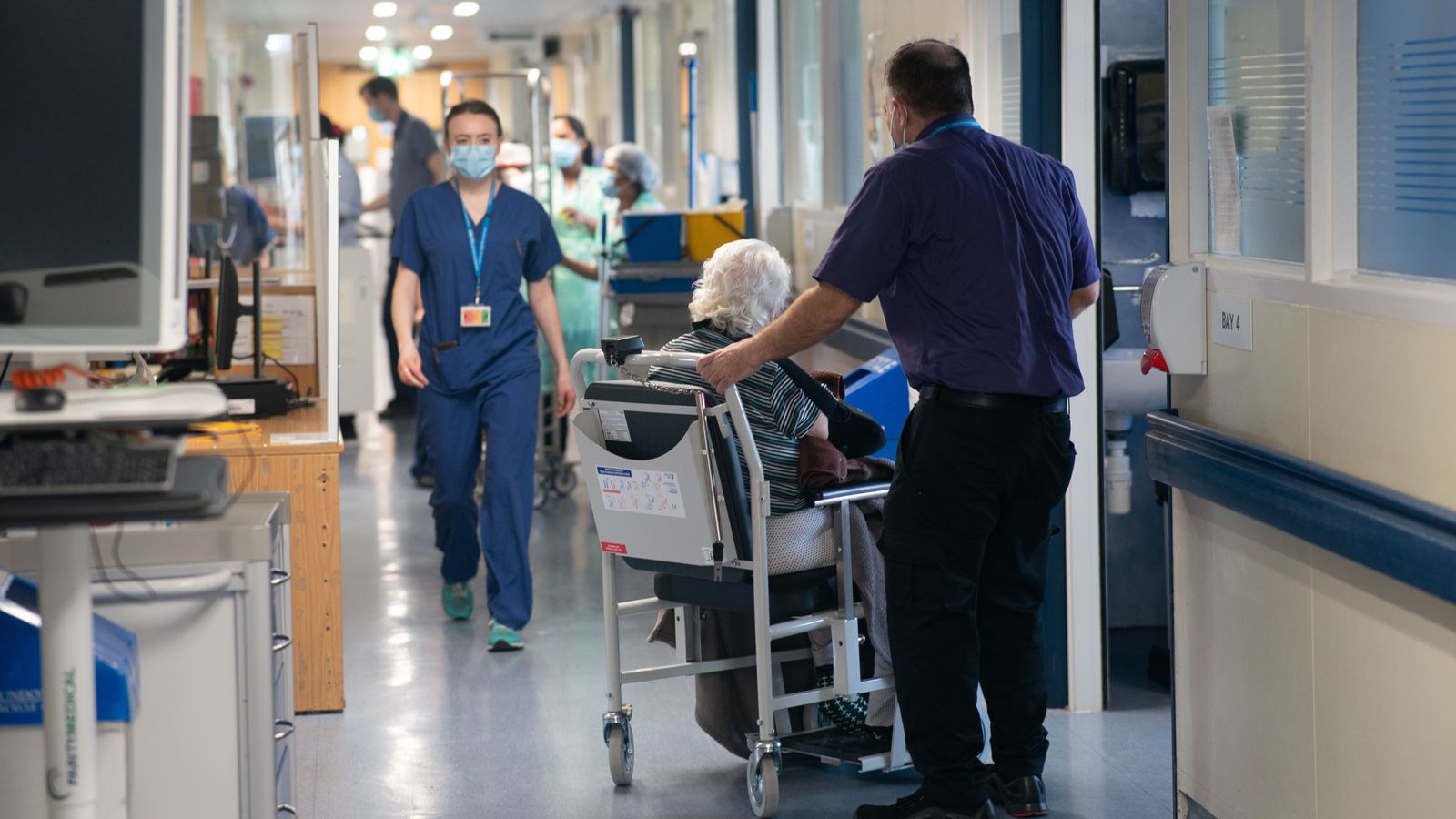The government plans to more than halve the number of NHS staff being recruited from abroad in the next 15 years, according to its long term workforce plan.
On Thursday, a preview of the plan announced the intention to funnel £2.4bn into solving the severe staffing crisis in NHS England.
The full document, which was published this morning, said the service aims to train more NHS staff domestically to “reduce reliance on international recruitment and agency staff”.
Politics latest: ‘Hugely important day for NHS’, minister says
“In 15 years’ time, we expect around 9-10.5% of our workforce to be recruited from overseas, compared to nearly a quarter now,” the NHS plan said.
The report also says:
• Half a million trainees will begin clinical training over the next six years
• The NHS hopes to recruit 300,000 new staff and retain 130,000 extra healthcare workers
• Training places will be expanded across the sector including: GPs (50%), adult nurses (92%), pharmacists (29%), dentists (40%), dental therapy and hygiene professionals (28%), healthcare scientists (13%)
• From autumn, recently retired consultant doctors will be given the option to return to work across England through the NHS Emeritus Doctor Scheme
• Almost a quarter of NHS staff (22%) will be trained via apprenticeship by 2031/32
• New medical degree apprenticeships will train 2,000 doctors by 2031/32
• Staff will be supported to access the new childcare measures announced in the recent budget
NHS ‘reliant on overseas staff’
The NHS, the report said, is “particularly reliant on international recruitment” to fill workforce gaps. The total proportion of NHS workers with non-UK nationalities – across all professions – has grown to more than 17%.
Since 2017, there has been a 2% increase in UK-trained medical graduates joining the workforce. By comparison, in the same time period, there has been a 121% rise in international medical graduates.
Of the doctors who joined the UK workforce in 2023, 50% were international medical graduates.
And, in 2022/23, about half of new nursing registrants in England were trained overseas.
“This leaves the NHS exposed to high marginal labour costs and risks the sustainability of services in the longer term given the growing global demand for skilled healthcare staff,” the report said.
But achieving the productivity improvements outlined in the plan is depending on ” a sustained increase in capital investment in the ageing NHS estate” and investing in digital infrastructure to allow the NHS to make the most of new technologies.
This includes replacing equipment that has passed its recommended lifespan and expanding “capacity to accommodate the increased demand for healthcare from an ageing population”.
“This would enable staff to function more efficiently, and shorten diagnosis and treatment times in areas such as cancer,” the report said.
New roles will be ‘trained and regulated properly;
The Prime Minister has insisted people being brought into new roles in the NHS will be “trained properly and they’ll be regulated properly”.
Rishi Sunak told reporters on a visit to Addenbrooke’s Hospital in Cambridge that the General Medical Council (GMC) will bring new roles like physician associates into its remit as regulator so they can prescribe.
He said “that’s what having a modern workforce is about”, adding: “It’s about adapting to how people’s health needs to be treated and if you talk to some of the people that I was talking to earlier, they’re doing all these new roles.
“We should be modernising the NHS so it’s fit for the future.
“Healthcare is evolving and the NHS needs to evolve with it, and that’s what the plan does.”
Mr Sunak insisted the plan “follows best practice internationally”, adding: “It’s something that people have talked about for a long time but we’re going to do.”
The growing vacancy gap
Vacancies currently stand at 112,000, and there are fears shortfalls could grow to 360,000 by 2037.
Shorter medical degrees, apprenticeships so staff can “earn while they learn” and more medical school places in the areas of greatest need were among the previous headline announcements.
Health Secretary Steve Barclay told Sky News this morning it was “a hugely important day for the NHS”.
But as the Conservatives have now been in power for 13 years, critics – including Labour’s shadow health secretary Wes Streeting – have been asking why the party hasn’t acted sooner.
Mr Barclay deflected these questions, telling Sky News “significant work” had already gone on to increase staffing levels.
Please use Chrome browser for a more accessible video player
No mention of pay
And while the plan focuses on retention and training, as waves of strikes continue across the health service, the preview contained no mention of pay.
Be the first to get Breaking News
Install the Sky News app for free
Unite General Secretary Sharon Graham said: “This looks like a bold plan to transform the training of new staff in the NHS. But the devil is in the detail as usual. There is a promise of funding for training for three years, but nothing about money for current staff.
“If there is not enough money to pay NHS staff a decent wage now, and transform current wage structures, then all the aspirations for more staffing in the training plan will fail to address the current crisis in the recruitment and retention of staff. That is what is at the heart of the current staff exodus”.






















